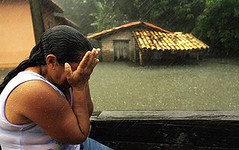Nexus between environmental degradation & human rights
I write to you from Australia, where an area bigger than Germany and France combined is under water. Filthy, noxious water and mud. Three-quarters of Queensland has been declared a disaster zone – that’s a disaster twice the size of Texas.
And it’s not just Queensland. Nearly all Australian states have suffered major flooding, from north to south, east and west, which is astounding when you think of the size of this continent and its starkly contrasting regions.
My own state of Victoria down south is host to flooding described as a mobile ‘inland sea’ approximately 25 miles by 56 miles.
This comes on the tail of a decade of severe drought. Our future, we’re told, is more of the same. Flood and drought – extremes rather than a genial middle ground.
Floods have a massive impact on human rights: the right to life, water, health, housing, clothing, work, food, education and more.
Brazil is also suffering catastrophic floods. Australia’s floods have claimed dozens of human lives, yet in Brazil the toll is in the hundreds.
 Climate change contributed to the global food crisis that hit in 2008 and shows no sign of abating without significant, concerted action. Given the 1 billion hungry people in the world today and the need to increase global food production by 50% by 2050 under increasingly challenging conditions, you don’t have to be a greenie to lose sleep over climate change.
Climate change contributed to the global food crisis that hit in 2008 and shows no sign of abating without significant, concerted action. Given the 1 billion hungry people in the world today and the need to increase global food production by 50% by 2050 under increasingly challenging conditions, you don’t have to be a greenie to lose sleep over climate change.
According to leading medical journal The Lancet, the biggest global health threat we face in the 21st century is not HIV, malaria, obesity or tobacco, but climate change. Since we all have a right to the highest attainable standard of health, climate change becomes a major human rights issue.
The need for climate change mitigation and adaptation is urgent, and of immense importance to human rights. Massive ‘reparations’ are owed by rich carbon-polluting nations, such as Australia, to the poorest, least culpable nations which nonetheless suffer the worst impacts of climate change.
We are generally familiar with the role of climate change in at least some floods, drought and bush-fires, typhoons, hurricanes and cyclones. Less well known, but increasingly supported by science, is how anthropogenic climate change can cause earthquakes, volcanoes and tsunamis.
Rather than being ‘acts of God’, we may have been behind the truly appalling ‘natural’ disasters of recent times, like the Indian Ocean and Samoan tsunamis and the earthquakes in Haiti, Italy, Indonesia and China.
If it seems like ‘natural’ catastrophes are happening more and more often, you’re not wrong. According to insurance giant Munich Re, their incidence worldwide has nearly tripled since 1980.
While some parts of Australia are still under water, elsewhere the water has retreated and the gigantic task of cleaning up has begun. Meanwhile, the Gillard government wants to pay for post-flood reconstruction by axing carbon reduction programmes.
First published by New Internationalist on 31 Jan. 2011
